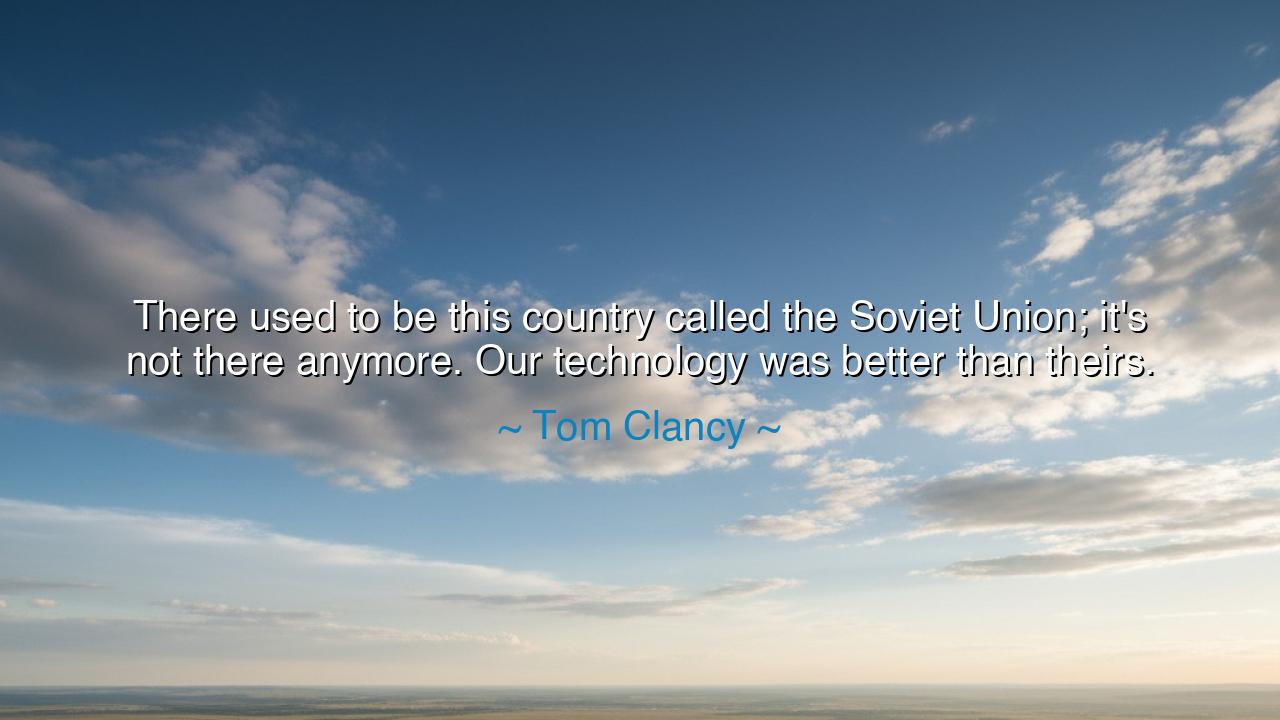
There used to be this country called the Soviet Union; it's not
There used to be this country called the Soviet Union; it's not there anymore. Our technology was better than theirs.






The words of Tom Clancy, “There used to be this country called the Soviet Union; it’s not there anymore. Our technology was better than theirs,” thunder like a record of history carved upon stone. He speaks of the collapse of a mighty empire, one that once stretched across continents, commanding armies, resources, and ideology. Yet even such power was not enough to endure, for in the great contest of the Cold War, it was not only men and weapons that determined victory, but the supremacy of technology.
The origin of this truth lies in the twentieth century struggle between the United States and the Soviet Union, a conflict waged not on open battlefields but through espionage, economics, ideology, and invention. The race to the stars, the competition for nuclear arms, the struggle for global influence—all were contests of innovation. In the end, it was the West’s ability to harness technology—from satellites and precision weapons to computer systems and communication networks—that tilted the balance. Clancy, a master storyteller of military thrillers, gave voice to this reality in words both sharp and simple.
History provides striking examples. Consider the development of the Strategic Defense Initiative—derided by some as “Star Wars”—which, though never fully realized, symbolized the technological might of the United States and the impossibility for the Soviet Union to keep pace. Likewise, the race for advanced computing, stealth aircraft, and precision-guided weaponry revealed a gap that widened with time. The Soviet empire, straining under economic weakness, could not bear the weight of matching the West’s technological advancement. Its collapse in 1991 confirmed Clancy’s observation: that nations rise or fall not only on ideology, but on their ability to master the tools of the future.
Yet the quote bears a deeper meaning. It is not merely about the past; it is a reminder that technology is power, and that civilizations which fail to adapt to its demands will falter. The Soviet Union was vast, proud, and disciplined, yet it could not transform quickly enough to match its rival. In this sense, Clancy’s words are a warning to every generation: do not rest upon size, tradition, or force alone. The tools of progress shape the destiny of peoples. To ignore them is to invite decline.
We may also look beyond politics to the stories of individuals who understood this truth. Consider the tale of Alan Turing and his colleagues at Bletchley Park during World War II. It was not armies alone that defeated the Axis powers, but the brilliance of men and women who built machines to crack the Enigma code. Their technological edge turned the tide of history. So too, the collapse of the Soviet Union echoes the same lesson: when ingenuity surpasses brute force, the future belongs to those who innovate.
The lesson for us is clear and urgent: adapt, innovate, and respect the power of technology. It is not enough to be strong in numbers or tradition; one must also be strong in creativity and vision. For the fate of nations, businesses, and even families depends upon the ability to use the tools of the age wisely. Let not arrogance blind you to this truth, for the ruins of the Soviet Union stand as a silent testimony to those who could not keep pace with progress.
Practical action is within reach. As individuals, seek always to learn and grow with the tools of your time—whether in science, communication, or art. As societies, invest in the minds of the young, in education, in innovation, in the courage to push boundaries. And above all, remember that technology is not merely about machines, but about the survival and flourishing of human communities. Used well, it uplifts and preserves; neglected, it leads to ruin.
Thus, let the words of Tom Clancy be remembered: the Soviet Union is gone, but its fall is a lesson for all ages. It was not might alone that decided its fate, but the relentless march of technology. Let us, therefore, walk with wisdom, ensuring that we harness progress not only to gain power, but to secure a future worthy of our children and their children after them.






AAdministratorAdministrator
Welcome, honored guests. Please leave a comment, we will respond soon